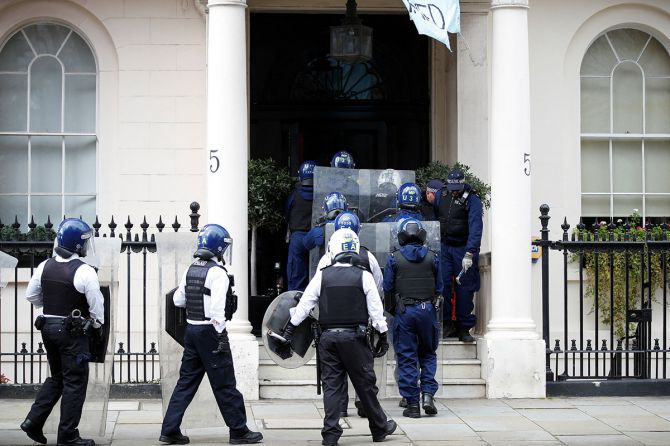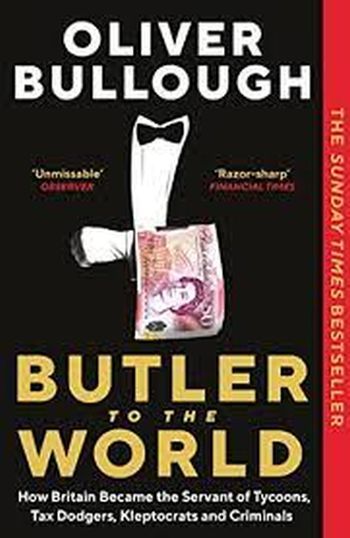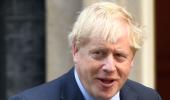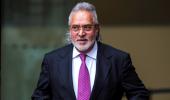Oliver Bullough's book offers a whirlwind trip of the dark underbelly of global finance, covering everything from tax law changes to aiding criminals to decamp with money from bank accounts.

Oliver Bullough is an impassioned critic of the role the global financial system plays in abetting the world's crooks.
His first book, Moneyland (2018), documents in fervid detail how kleptocrats build illicit wealth through seemingly legitimate means.
That book presciently started with a description of deposed Ukrainian strongman Viktor Yanukovich's palace, which the public seized after he fled in 2014: A 'temple of tastelessness, a cathedral of kitsch, the epitome of excess,' built while he earned a government salary.
In Butler to the World, published in 2022 and updated in a 2023 paperback edition after Russia's invasion of Ukraine, Mr Butler narrows his field of vision to show how Britain became a global money laundromat and purveyor of dodgy practices in its quest for post-Empire dominance.
The term 'butler' plays on a quintessentially British institution made famous by a very British writer, P G Wodehouse.
In the role, the suave and educated servant Jeeves plays to his upper class master, Bertie Wooster, Mr Bullough sees similarities with the amoral role declining Britain has chosen to play in global business.
'Over the last seventy years or so, Britain has transformed itself into a global enabler of skulduggery, a servant to anyone who can afford the fees...,' he writes.
'Just as Reginald Jeeves employed his huge intellect and extensive experience to help quarter-witted posho Bertie Wooster and his Drones Club chums evade the consequences of his misbehaviour in P G Wodehouse's novels, Britain helps the world's oligarchs, financial criminals and tax dodgers hide their wealth... and enjoy the fruits of their crimes free of scrutiny.'
Jeeves is more than a butler, supplementing his salary with handsome tips for getting Wooster and his chums out of scrapes.
The point is that 'behind Jeeves's polished exterior is someone prepared to help anyone who can pay him'.
Take away his immaculate appearance, his educated accent and his ability to quote Marcus Aurelius, and you have not a butler but a consigliere.
Although Mr Bullough's focus is Britain -- he conducts 'kleptocracy tours' in London -- the book is more than a parochial censure of his country.
He shows how Britain's conscious facilitation of this system has deleterious consequences for the world's most vulnerable people.
The transformation began around the end of the empire with the 1956 Suez crisis.
With the collapse of sterling after the US President Dwight David Eisenhower angrily declined to intervene in this Anglo-French misadventure, the Bank of England and British merchant bank management, incestuously upper class, needed a new source of funds to stay in business.
The solution they found, an early example of financial butlering, was in a curious financial instrument, the Eurodollar, or US dollar-denominated deposits in foreign banks.
The Eurodollar both is and isn't a US dollar.
As Mr Bullough explains, 'If you wanted to take advantage of the vitality and strength of the US economy, they were dollars; if you wanted to avoid restrictions imposed by the US government, they weren't.'
This offshore currency encouraged bankers to flock to London and avoid US restrictions on interest rates or British ones on capital controls.
By linking national money markets, the Eurodollar limited national governments' ability to intervene in the markets to address interest rates, inflation or defend its currency.
The inflationary problems it accentuated in the US prompted an exasperated Richard Nixon to take the dollar off the gold standard.
Once the US dollar became like the Eurodollar in that its value was determined by the market and headed to wherever it earned maximum returns, the US and Britain started a race to the bottom in terms of competitive deregulation -- a Eurodollar historian called it a 'transatlantic regulatory feedback loop'.
Mr Bullough describes the impact of this unrestricted flow of capital between countries -- 'footloose capital' -- in the dismantling of the welfare State with governments' options on raising taxing to finance social expenditure increasingly constrained.
All this happened well before the Thatcher-Reagan deregulations.

Britain pioneered other forms of financial butlering, the opaque shell company networks from obscure islands formerly part of the empire being the best known of them.
Mr Bullough traces its origin to the British Virgin Islands (BVI), where Mossack Fonseca, of 'Panama Papers' fame, relocated.
Today, BVI is one of many outposts that sells 'discreet and affordable asset protection services, all guaranteed by the pleasant and reassuring solid presence of the British flag' to North Korean arms smugglers, crooked Afghan officials, US tax dodgers, Kremlin kleptocrats.
In one of its earliest uses, British defence giant BAE Systems leveraged a BVI shell corporation network to supply an unneeded and overpriced radar installation to newly independent Tanzania, one of the world's poorest countries.
Huge sums from this inflated order were diverted to Indian-origin middleman Shailesh Vithlani's BVI shell company for 'technical services', which investigations revealed were really a giant tax dodge.

From rejigging tax laws to attract gambling revenues, creating an addiction crisis, to an obscure Scottish 19th century law on partnerships that enables East European criminals to decamp with money from bank accounts, Mr Bullough takes us on a breathless ride through the seamy side of international finance. He writes with brio and an entertaining eye for detail.
The latest edition would have been more complete, however, had the writer explained how laws requiring greater ownership disclosures of real estate assets and post-Brexit changes in passporting rights of banks and financial institutions to do business in the EU have impacted the butlering business -- or not.
Butler to the World: How Britain became the Servant of Tycoons, Tax Dodgers, Kleptocrats and Criminals
Author: Oliver Bullough
Publisher: Hachette
Pages: 273
Price: Rs 699











 © 2025
© 2025